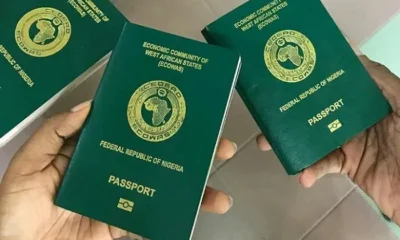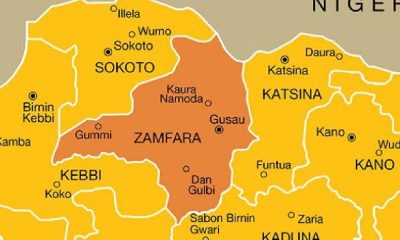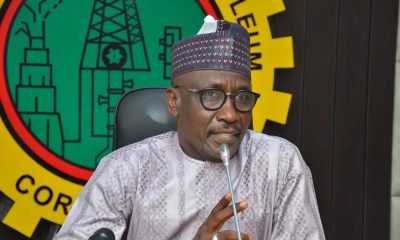Economy
EXPOSED: CBN uncovers $2.4bn forex scam

In a startling revelation, the Central Bank of Nigeria (CBN), Governor Yemi Cardoso, has disclosed that law enforcement agencies are investigating foreign exchange forwards valued at approximately $2.4 billion.
Cardoso noted that these transactions are deemed ineligible for payment.
This disclosure emerged after the Monetary Policy Committee (MPC) meeting held in Abuja on Tuesday, March 26.
The CBN governor shed light on the meticulous forensic audit conducted on these transactions, uncovering numerous discrepancies and rendering them invalid.
The CBN, upon settling certain tranches of FX backlog, encountered transactions marred by issues concerning their authenticity.
Consequently, Deloitte management consultants were engaged to conduct a comprehensive forensic analysis spanning several months to scrutinize the legitimacy of these forward-contracted transactions.
During the audit process, it was established that several transactions failed to meet the criteria for validation. Instances were found where allocations worth millions of dollars were disbursed without corresponding requests, and some transactions lacked proper documentation or were outright illegal.
According to Cardoso, “In the cause of that forensic audit, we determined that a number of these transactions did not qualify. In some cases, you had some requests, which well you actually had some allocations that were made in millions of dollars, which were never requested for.
“You also had somewhere they had no Naira and they were also allocated, you know, huge sums, the foreign exchange and the list goes on and it was for that reason that we refused to validate those particular transactions.
“We refused to validate them because you know apart from the fact that documentation was not satisfactory in many cases they were outright illegal and the law enforcement agencies of course are now looking into those transactions that are as far as we’re concerned, not valid to be paid.”
Addressing concerns about potential backlogs among stakeholders, Cardoso assured that the market remains open and transparent for them to address any outstanding contractual obligations. However, the CBN has diligently verified and settled recognized backlogs of forward transactions.
Cardoso reiterated the CBN’s commitment to maintaining price stability and fighting inflation. He emphasized the need for strict adherence to the core mandate of the central bank, ensuring the restoration of the average Nigerian’s purchasing power.
To this end, the MPC announced a significant hike in the benchmark interest rate to 24.75 percent as part of efforts to curb inflation. This decision, accompanied by adjustments to reserve requirements for banks, aims to tighten control over the money supply and stabilize prices.
According to Cardoso, the committee decided to: raise the Monetary Policy Rate (MPR) by 200 basis points to 24.75 percent from 22.75 percent; adjust the asymmetric corridor around the MPR to +100/-300 basis points; retain the Cash Reserve Ratio of Deposit Money Banks at 45.0 percent; adjust the Cash Reserve Ratio of Merchant Banks from 10.0 percent to 14.0 percent and retain the Liquidity Ratio at 30.0 percent
Looking ahead, the CBN anticipates a gradual moderation of inflation rates by May, with measures in place to foster economic growth while maintaining price stability. The committee called for the full implementation of agricultural policies to enhance food supply and urged broader fiscal consolidation to improve tax collection.
Furthermore, Cardoso addressed concerns regarding the forex market, emphasizing the need to foster competition and transparency. He criticized the “oligopolistic nature of restrictions on dairy imports,” advocating for an open and inclusive foreign exchange market.
On the issue of cryptocurrency regulation and the Binance scandal, Cardoso clarified the CBN’s limited role, highlighting collaboration with relevant authorities while emphasizing that cryptocurrency regulation falls under the purview of the Security and Exchange Commission (SEC).
Economy
Naira Records Marginal Decline Against Dollar at Official Market

The Nigerian naira experienced a mild drop in value on Friday, closing at ₦1,602.18 per dollar in the official foreign exchange market, based on figures released by the Central Bank of Nigeria (CBN).
This marks a decrease of ₦5.49 from the rate of ₦1,596.69 recorded on April 30, the last trading day before the May 1 Workers’ Day holiday—indicating a depreciation of approximately 0.34%.
Earlier in the week, from Monday to Wednesday, the naira remained relatively stable, exchanging at ₦1,599.95, ₦1,599.71, and ₦1,596.69 respectively.
Although the local currency showed some consistency mid-week, it wrapped up the week with a loss, following a sligh dip of 0.02% at the beginning of the week
Economy
Black Market Dollar hits N1,610 Amid Economic quagmire

What is the Dollar to Naira Exchange Rate in the Black Market (Also Known as the Parallel Market or Aboki FX)?
Below is the black market exchange rate for the U.S. dollar to the Nigerian naira as of Thursday, May 1, 2025. These are the typical rates at which you can exchange dollars for naira:
Dollar to Naira Black Market Exchange Rate (May 1, 2025):
At the Lagos Parallel Market, also referred to as the black market, Bureau De Change (BDC) operators are buying dollars at ₦1,602 and selling at ₦1,610, according to market sources.
Please note: The Central Bank of Nigeria (CBN) does not recognize or endorse transactions conducted on the parallel market. The CBN advises individuals and businesses seeking foreign exchange to use official banking channels.
Economy
Naira nosedives to N1,615/$ in parallel market

The naira depreciated to N1, 615 per dollar in the parallel market from N1,610 per dollar on Monday.
Likewise, the Naira depreciated to N1,602 per dollar in the Nigerian Foreign Exchange Market (NFEM).
Data published by the Central Bank of Nigeria, CBN, showed that the indicative exchange rate for the naira rose to N1,602 per dollar from N1,596 per dollar on Monday, indicating N6 depreciation for the naira.
Consequently, the margin between the parallel market and NFEM rate narrowed to N13 per dollar from N14 per dollar on Monday.
-

 News21 hours ago
News21 hours agoFive Asian countries Nigerians can visit without a visa
-

 Entertainment22 hours ago
Entertainment22 hours agoOld Prophecy Of Pastor About VeryDarkman Goes Viral After His Arrest
-

 News22 hours ago
News22 hours agoInsecurity! Bandits abduct 25 female wedding guests
-

 News21 hours ago
News21 hours agoTompolo Launches Door-to-Door Campaign for Tinubu’s 2027 Re-Election!
-

 News21 hours ago
News21 hours agoEzekwesili slams political establishment over harassment allegation, defends Natasha
-

 News9 hours ago
News9 hours agoFormer Plateau deputy governor is dead
-

 News15 hours ago
News15 hours agoINTERPOL uncovers 150 stolen vehicles from Canada in Nigeria, Gambia, other W.A. countries
-

 News22 hours ago
News22 hours agoKyari breaks silence: “I’m not in EFCC custody, I served God, country, not corruption”




